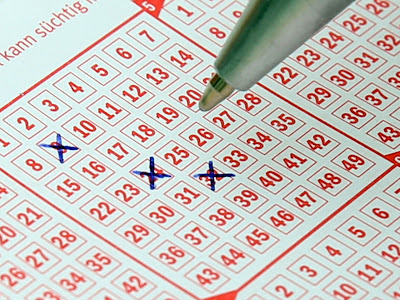The basic argument in favor of government lotteries is that they bring in millions of dollars to government, money that would probably otherwise be had only by raising taxes. Well, lotteries, who actually wins and who loses? And how easy it is to win! say supporters. It's like a tax that no one is required to pay; it's voluntary. In fact, people are eager to pay; they wait in line to pay!
But, what are some of the charges against lotteries?
One is that lottery advertisements are often uninformative or just plain misleading. They promote the idea that you are going to win. Typical is a Canadian lottery advertisement that states: "We make it easy to . . . WIN!!"
But how easy is it to win? Alie plays a West German lottery. The advertisement gushes: "Your winning chances are incredible." Yet, Alie laments: "I've played the lottery for ten years,and I have never won anything. And I don't know anybody else who has won anything either."
For every big winner, there are millions like Alie, losers who put out their money week after week, year after year, but who get nothing in return. In the United States, those who win $1 million are 0.000008 percent of the 97 million lottery gamblers there.
The odds against winning a top prize are not merely one million (roughly, the odds against a person's being stuck by lightning); they can be one in many millions. For example, when it became clear that the bigger the jackpot, the more tickets were sold, the odds against winning the New York Lotto game shot up from 1 in 6 million to 1 in 12.9 million!
Little wonder that people charge lotteries with hustling unwary purchasers oblivious to the enormous odds against them. Dr. Valerie Lorenz, director of the U.S. National Center for Pathological Gambling, states simply: "Lotteries? It's the biggest sucker bet there is. The odds are so outrageously against you."
And What if you do win a million dollars? You won't get it all. After the tax man takes his cut, winners in the United States receive $35,000 each year for 20 years. That is $700,000, reduced further in value by inflation over 20 years.
LOTTERIES: EFFECT ON THE POOR
Another criticism is that the big spenders are poor people, those least able to afford it. Lottery promoters argue that this is untrue, that surveys show that the lottery is more popular among middle-income people. Lotteries are voluntary, they say; no one is compelled to play. Nevertheless, advertisements deliberately inflame the desires of players, and many are poor people. Said a convenience-store cashier in Florida: "we have a fixed group of people that we see every week. Some buy 10 tickets every day. Some buy 100 tickets every week. They don't have money for food, but they play 'Lotto.'"
In some less developed countries, the situation is often even worse. Recently the Indonesian government re-exclaimed its Porkas football lottery when the media reported that entire villages had gone "Porkas crazy." Asia week magazine reported: "[Indonesian] newspapers were full of horror accounts: Men beating their wives or children; children stealing money from their parents; children spending hard-earned money allocated for school fees-all for Porkas."
With the proliferation of lotteries worldwide, more and more people are introduced to gambling. Some, not just the poor, become compulsive gamblers-lottery addicts. Arnie Wexler heads the Council on Compulsive Gambling in New Jersey, U.S.A. He says: "The legislators think they've found a pairless, easy way to raise money, when in fact, they're destroying a lot of families, and a lot of business, and a lot of human beings, and a lot of lives."
Queries of Values In Lotteries
Another major concern is that government lotteries have changed people's attitudes toward gambling. Today's State-operated "Play 3" or "Lucky Numbers" lotteries offer thousand-to-one odds but return only about 50 percent in prize money. Before government got into business, the game was "vicious," an illegal racket, a vice. Now the same game is called entertainment, fun, an act of civic responsibility!
Of course, an important difference between the illegal numbers game and government lotteries is that instead of profits going into the pockets of criminals, they support government projects. Nevertheless, many observers worry about the impact of lotteries on the ethical values of the society they are supposed to benefit.
This is because lotteries feed the hope inclination to become rich without effort. Paul Dworin, editor of Gaming and Wagering Business, said: "In the past, the state has said that if you work hard, you'll do well. Now it's 'Buy a ticket and you'll be a millionaire,' that's a strange message for a state to send." And George Will wrote in Newsweek: "The more people believe in the importance of luck, chance, randomness, fate,the less they believe in the importance of stern virtues such as industriousness, thrift, deferral of gratification, diligence, studiousness."
Another concept, central to human society, is this: Individuals should not try to profit from the misfortunes of others. The promoters of lotteries, however, encourage the view that it is right for an individual to draw profit and pleasure through the loses of others.
Despite the many voices of opposition, lotteries continue to grow dramatically throughout the earth. A visitor to West Africa observed hundreds of people massed around a State lottery building. "Why do all these people squander their money on the lottery," he asked a resident, observing, "especially since they are poor people?"
"My friend, they play the lottery because it gives them hope," replied the resident. "For many of them, it's the only hope they have in life."
But is winning the lottery really a hope? It's much more an illusion, a mirage, an improbable dream.







1 Comments
Casinos Secret Ate My Own – The Secret Ate My Own
ReplyDeleteSecret Ate My Own – The カジノ シークレット Secret Ate クイーンカジノ My Own. I fun88 soikeotot will share with you the secrets of my love for slots and gaming.